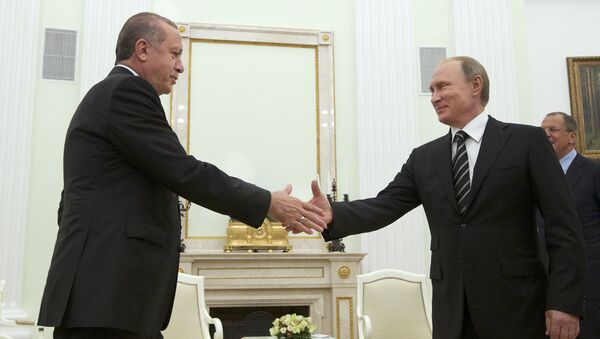However, economics, trade and tourism are only the tip of the iceberg. Reconciliation between Moscow and Ankara will not be easy and take significant political and diplomatic efforts, an article in the Turkish newspaper Hurriyet read.
After Turkish President Recep Tayyip Erdogan sent a letter of apology to Russian leader Vladimir Putin, normalization between Moscow and Ankara has begun. Moscow cancelled the travel ban and a number of restrictions for Turkish businessmen. The two countries also agreed to work together on a number of issues, including Syria.
"Moscow and Ankara have long sought reconciliation, one that would not hurt the image of either country. Erdogan’s letter to Putin was shrewd. Moscow perceives and presents it as an apology while Ankara avoids reputational costs. Now Turkey needs to restore economic relations with Russia and impose itself on the Syrian peace process," Areg Galstyan specializing in Russian affairs wrote in an article for The National Interest.
However, a thaw between Russia and Turkey is more than meets the eye. It will depend not on formal procedures but on a roadmap Turkey and Ankara will follow at an unofficial level, according to Hurriyet.
"It’s too early to say that the current thaw will stay for long. There a number of informal issues creating problems for bilateral ties, first of all Syria," the article read.
The incident with the downed Russian bomber only triggered the conflict but the conflict itself was actually rooted in contradictions between Moscow and Ankara, including on Syria, Iraq, Iran, Israel, Crimea, and Armenia and Azerbaijan.
"Moreover, there may be third parties trying to undermine the normalization of ties between Russia and Turkey," according to the article.
Kulikov underscored that the main difficulty is that Moscow and Ankara will have to establish all over again cooperation on a wide range of issues.
According to Hurriyet, in the current environment, cooperation would serve the interests of both Russia and Turkey.
"Turkey is fighting terrorism thus it should not set itself against such a significant player as Russia. At the same time, Russia is trying to strengthen its role in the Middle East, but it will not succeed in Syria without cooperation with Turkey," the article read.



